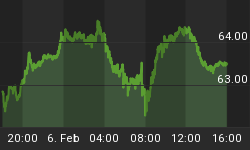What is a 'Bull' market? It is a market in an upward price phase of a market with the expectation that it will be followed by a 'Bear' or downward phase of a market. This mindset is common to all markets. Sayings like, "everything that goes up must come down" is pretty standard and taken as part of life itself, but few examine it to see if it is really true. Why should everything that goes up come down? For some years now gold has been thought of as moving in the opposite direction to the U.S. Dollar. So if gold goes up it must come down must also mean that if the Dollar goes down it must come up? Is that true? The history of currencies in the last few thousand years tell us something quite different. Currencies have gone down and never come up again, just disappeared. Gold has always retained a monetary value. Since the eighties to 1999, gold has gone down and in this century has gone up. So we take issue with the saying, in the light of the history of gold. Even though the 'powers that be' have tried to discredit gold and underlying money, the vast majority of central banks have retained most of their gold because they believed it to be a very valuable reserve asset.
What sort of Market is Gold?
A very accurate saying is doing the rounds at the moment, it is, "People buy gold, not to make money, but because they have money." This has always been true, because gold is the Ultimate Money! Unlike commodities it is hardly consumed. Lost yes, but not consumed as other metals and commodities are. It is held as a measure of wealth by bankers, funds, individuals.
The gold market is important in the context of this subject too, because gold is not an ordinary market, it is different from any other. It comes into its own when trust breaks down, when fear rises and confidence falls. And pre-1971 it was always money. This is important because the gold price has defined by a currency price since the early thirties. Why do we say this?
Before then the price of a currency was defined by gold. Each note of currency at one time was described as the number of ounces it represented. It was a bill, a representation of the gold backing it. It was a gold I.O.U. Then the switch came mentally in the murky monetary days somewhere between the dropping of the gold Standard and the Nixon Administration's floating of the gold price away from the Dollar. Take a look at these two notes we have put here in the article. Put your cursor on the corner of each in turn and enlarge them so you can read the writing. You will see what we mean by a 'bill' representing gold. Gold always had a role as money and now has a role in backing money as a reserves asset. Roughly translated this means when push comes to shove gold will be money always. It is this role, as money to a greater or lesser extent that makes it different to any other money.
The next question is how can money be in a 'bull' market? It is a misnomer because it conveys the wrong concept to investors.
Is Gold in a 'Bull' market then?
No! It is money that is in the long process of returning to the center stage of the monetary system.
While this happens, prudent individual and institutional investors are acquiring it, while they can, ahead of the devaluing of un-backed currencies.
We do not believe that the gold price is going to fall back below $300 an ounce and probably not below $1,000. Gold will not enter a bear market by falling as equity markets are prone to do today. It is not an item whose demand will fall away. We expect that once its rise does plateau at some point it will remain at whatever level it reaches. Many do feel that the current investment demand will peter out once confidence returns to un-backed currencies. We find it more than difficult to believe that as we watch monetary authorities from the corners of the world moving to acquire more for their long-term reserves while worrying about the future of the currencies they have in their reserves.
Central banks have started to re-acquire it, while previous sellers of gold have stopped selling their gold. [The I.M.F. managed to acquire 403 tonnes of it from its Members, but the balance of the gold held by the I.M.F. is held on behalf of its members and is not the property of the I.M.F. itself.] Central banks are the very authorities that deemed gold to be money before they invented un-backed currencies. As the world's governments try to retain their international competitiveness by moving their exchange rates down, their role as a measure of value is being debauched. This gives rise to the need for something to measure currencies against. It will happen eventually, we believe in a careful process.
First we expect a basket of currencies to be used. In time, gold will be introduced into that basket, if not from the outset.
Where do Central Bankers see Gold in the next 25 years and why?
Subscribe through www.GoldForecaster.com















